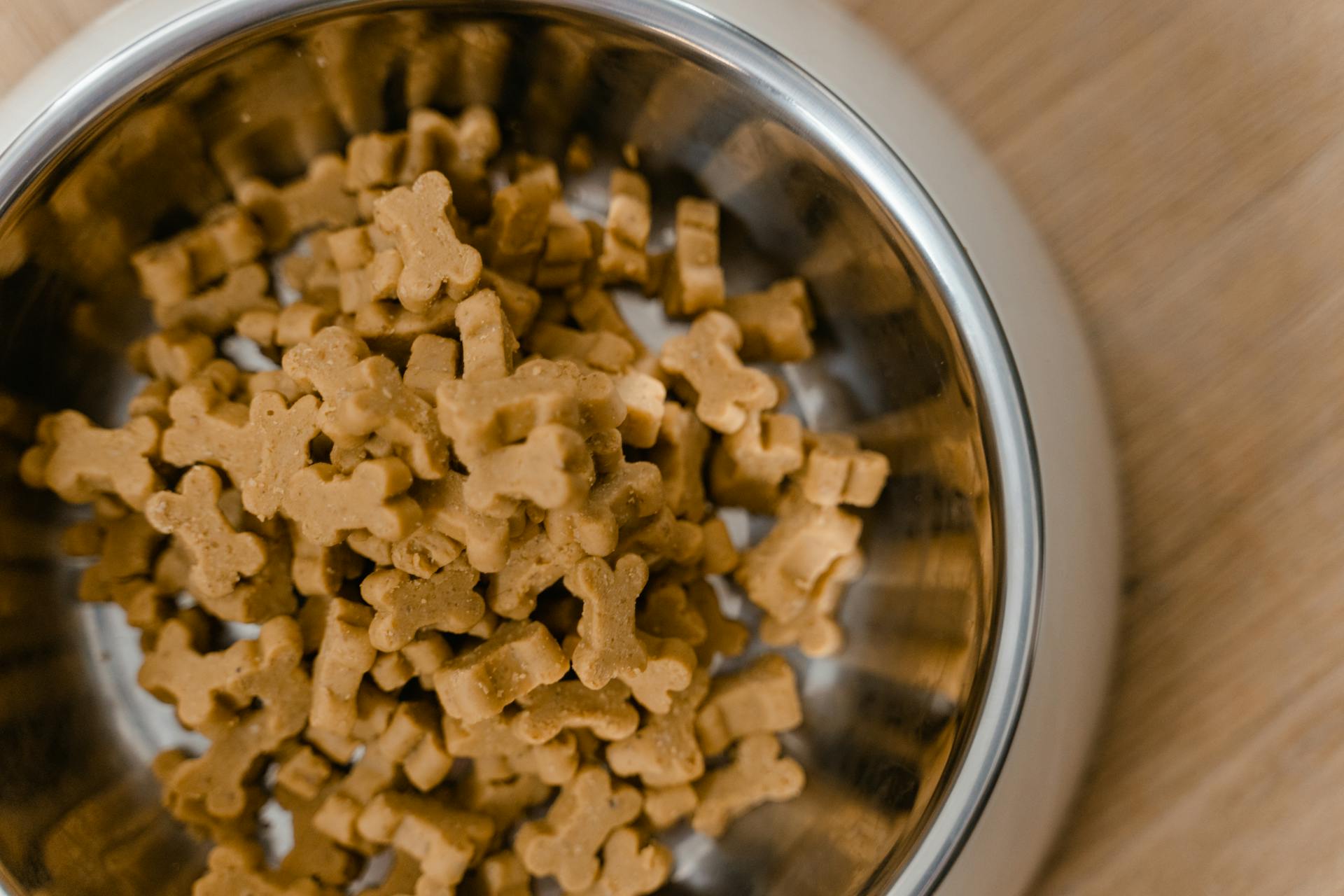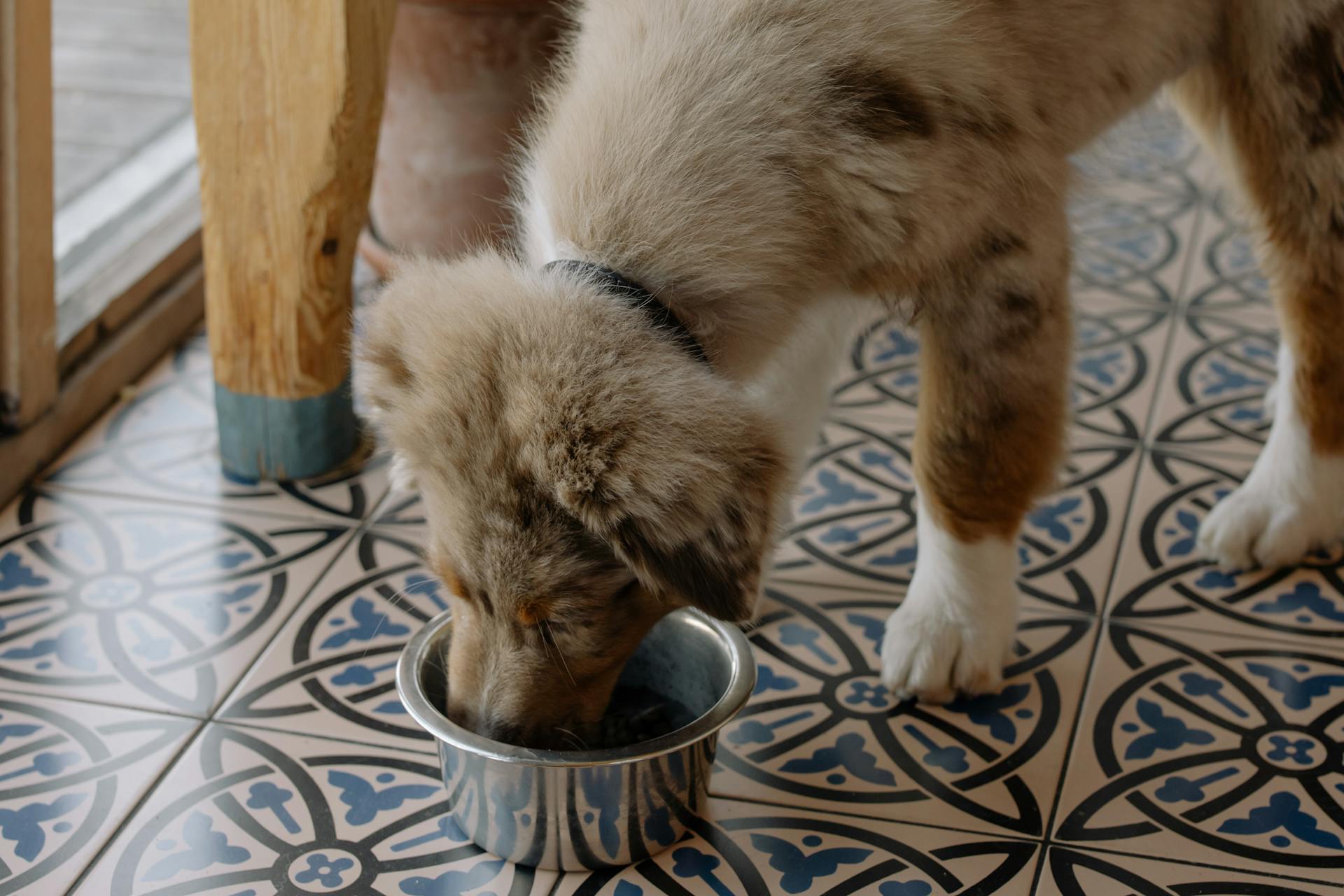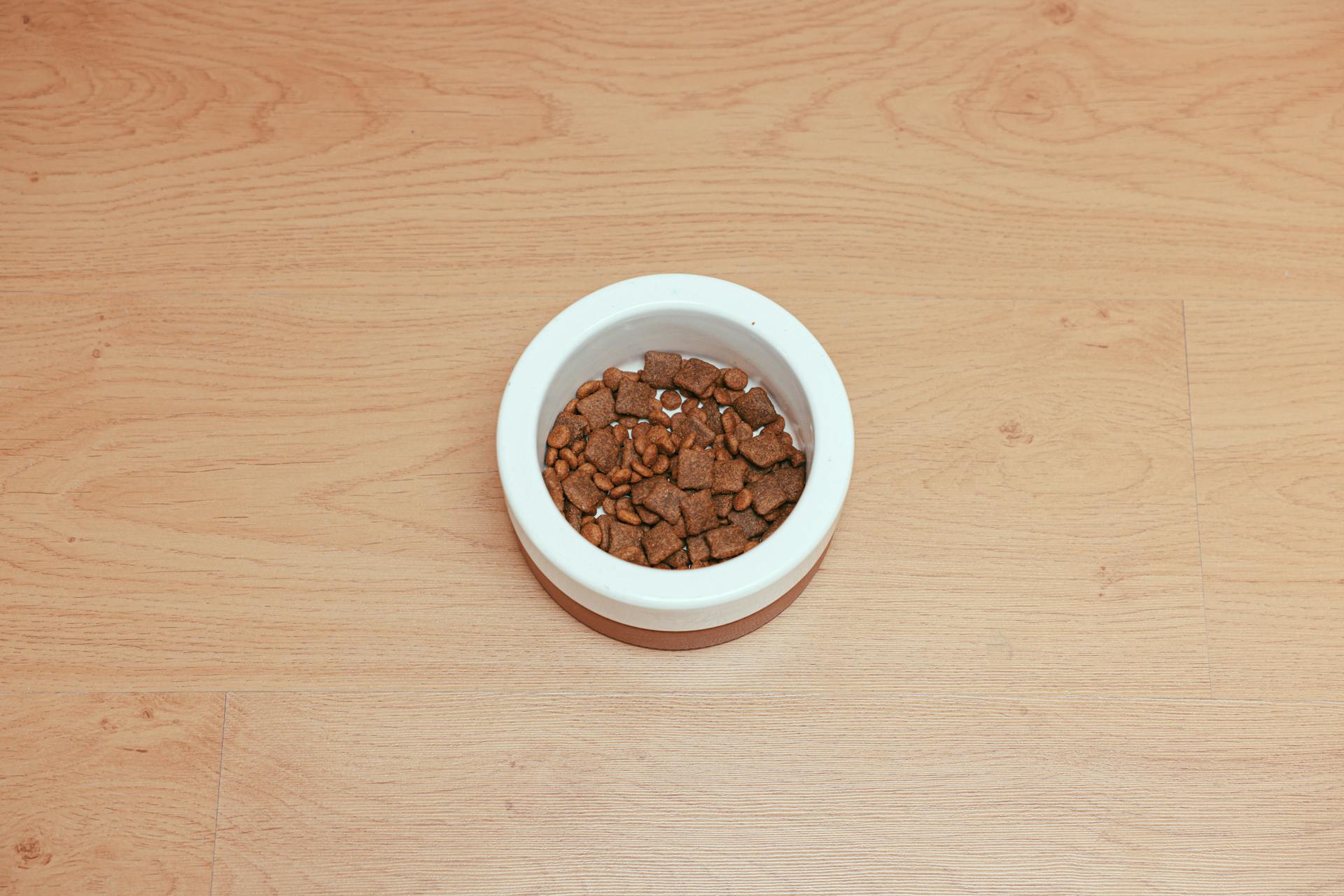
As a new puppy owner, it's essential to understand the importance of proper nutrition for your furry friend's optimal health. Puppies have different nutritional needs than adult dogs, and feeding them the right food can make a huge difference in their growth and development.
Puppies need a diet rich in protein, which helps build and repair their muscles, bones, and organs. According to the article, puppies require a minimum of 22% protein in their diet to support their growth and development.
Choosing the right puppy food can be overwhelming with all the options available. However, it's crucial to select a high-quality puppy food that meets your puppy's nutritional needs. Look for a food that is specifically formulated for your puppy's life stage, whether it's for large or small breeds.
A well-balanced puppy food should contain all the necessary nutrients, including vitamins and minerals, to support your puppy's overall health.
Suggestion: Is High Protein Dog Food Good for Dogs
Nutrient Requirements
Calcium and phosphorus are crucial for puppy growth, and their ratio is just as important as their individual levels. A ratio of 1.1:1 to 2:1 is recommended to maintain hormonal balance.
Dietary calcium should be between 0.8% and 1.2% on a dry matter basis, with larger breed puppies requiring slightly lower levels. Excess calcium can lead to developmental orthopedic diseases, such as osteochondrosis and wobbler syndrome.
Puppies younger than 5 months can't adjust calcium absorption, so an oversupply or undersupply can be harmful. Fractures can occur in smaller breed puppies with diets containing less than 0.33% calcium on a dry matter basis, while larger breeds present with fractures at a calcium level of less than 0.55%.
Protein requirements are higher in growth than in adulthood, with a minimum requirement of 180g/kg (18%) dry matter (DM) crude protein and a recommended allowance of 225g/kg (22.5%) DM. Protein should account for at least 25% of energy, and excess protein can lead to fat deposition and weight gain.
Essential Nutrients
Calcium is essential for skeletal mineralization during growth, and puppies under 5 months can't adjust its absorption in response to intake. So, it's crucial to get the right amount of calcium in their diet.
A diet deficient in calcium can lead to pathological bone fractures in smaller breed puppies when the diet contains less than 0.33% calcium on a dry matter basis. Larger breed puppies can experience fractures at a calcium level of less than 0.55%.
The ratio of calcium to phosphorus greatly impacts phosphorus retention, and a ratio of 1.3:1 allows for good phosphorus retention. However, levels above a ratio of 2:1 will decrease phosphorus retention.
Protein requirements are higher in growth than in adulthood because of muscle building in addition to normal maintenance needs. Protein should account for at least 25% of energy.
A diet with excess protein can lead to an increase in the glomerular filtration rate and increased urea excretion in the urine, but there's no evidence of damage to the kidneys.
Growing puppies require higher levels of protein than adult dogs of the same breed to promote proper growth and development. The NRC recommends a minimum of 180g/kg (18%) DM of crude protein.
The energy density of protein is similar to that of carbohydrates, so an excess of protein in the diet may lead to fat deposition and weight gain. This excess weight can lead to abnormal joint development.
Fat is a nutrient that provides more energy per gram than all other nutrients, and it's essential for reaching the increased energy requirements of puppies. Fat provides 9.4kcal/g of gross energy.
Adequate intake of omega-3 fatty acids, particularly DHA, is crucial for neurological development and can aid in memory and learning ability. A deficit of dietary n-3 fatty acids can lead to cognitive deficits and increased n-6 fatty acid levels, which increase inflammation.
The NRC recommends a minimum of 85g/kg (DM) of total fat and 0.5g/kg (DM) of omega 3 fatty acids (EPA+DHA) for optimal growth and development.
Consider reading: Fat Dogs Food
Vitamin E
Vitamin E plays a crucial role in supporting the development of eyesight and reducing oxidative damage.
The adequate intake level of vitamin E is 24 mg/kg (36 IU/kg) according to the NRC, but this may not be sufficient for optimal immune protection.
A higher level of vitamin E, specifically 500 IU/kg, has been shown to greatly increase the number of memory CD4+ immune cells, aiding in a greater and longer response to infection.
For more insights, see: Next Level Giant Breed Dog Food
Puppies are more susceptible to infection due to their still-developing immune system, and proper levels of vitamin E are essential in their diet.
The AAFCO recommends a minimum of 50 IU/kg DM, but this is still lower than the optimal level of 500 IU/kg for immune protection.
Ensuring adequate vitamin E levels in your dog's diet is crucial for optimal immune function and overall health.
Iodine
Iodine is crucial for puppy development, but it's easy to overdo it. The National Research Council recommends an adequate intake of 900 μg/kg (DM) of iodine, which translates to 220 μg/1000 kcal.
High levels of iodine can cause hypothyroidism and changes in bone metabolism in puppies. This is because thyroid hormones play a key role in osteogenesis, stimulating osteoblasts and promoting collagen synthesis and mineralization of the osteoid.
Puppies need to be monitored closely to prevent overdosage of iodine, especially during juvenile development. Overdosing can lead to a delay in the maturation and development of the ossification sites of newly-developing bone.
The recommended maximum allowance of iodine is 900 μg/kg (DM), which has been shown in multiple studies to result in no abnormalities.
Energy Requirements
Energy requirements are crucial for your puppy's growth and development. The resting energy requirement (RER) can be calculated using the equation RER = 70 × (body weight in kg), or for puppies weighing 2 to 30 kg, RER = (30 × body weight in kg) + 70.
Puppies need a balanced diet to meet their energy requirements. Overfeeding can increase the amount of minerals and vitamin D ingested, which may adversely affect skeletal growth. It's recommended to calculate the patient's daily energy requirement (DER) and provide it over 2 to 4 meals per day, with only a 10% allowance for treats.
The table below outlines the energy needs for an average large- or giant-breed puppy. Note that these values are for an average puppy and may vary depending on individual factors such as activity level and breed.
After spaying or neutering, the patient's energy requirement will rapidly decline, and a reduction in DER by 10% or more is warranted. During this time, the patient should be monitored for excess weight gain and the family educated on the importance of maintaining a healthy body condition.
Diet and Nutrition
Proper nutrition is crucial for a puppy's growth and development. Puppies have unique nutritional needs, including proteins, amino acids, fats, carbohydrates, calcium, and DHA that are crucial in supporting their rapid growth rates.
Feeding your furry friend a balanced diet of high-quality, nutrient-rich puppy food is paramount for their health. Experts suggest that treats should make up no more than 10% of a puppy's daily caloric intake to avoid excess weight.
Small breed puppies have different nutritional needs than large breeds. They become adults faster and may see their metabolism slow more quickly, so be wary of how you're doling out treats.
Here are some general guidelines to keep in mind when feeding your small breed puppy:
- Small breeds become adults faster and may see their metabolism slow more quickly than large breeds.
- Treats designed for average dogs could contribute as much as a quarter of your little puppy's caloric needs for the whole day.
- Use the parents' weights as a guide if you can, as there are significant differences in sizes from breeder to breeder with small-breed dogs.
Fresh puppy food, like Nom Nom, is often much more digestible than processed kibble or wet food. This means your puppy can get more energy and nutrients per bite.
Synopsis
Puppies require a diet that meets their unique nutritional needs, including proteins, amino acids, fats, carbohydrates, calcium, and DHA, which are crucial for their rapid growth rates.
A balanced diet of high-quality, nutrient-rich puppy food is essential for their growth and development.
Puppies need more protein than adult dogs, so it's crucial to include the right amounts to support healthy development.
Dietary fats help meet their high energy demands and provide essential fatty acids for brain, neuron, and retinal development.
Puppies are more susceptible to infection during growth, but adding proper levels of vitamin E to the diet can reduce free radical oxidative damage and increase immunity.
Calcium and phosphorus in the right amounts and ratio aid in proper bone and cartilage growth and maturation.
Over-dosing on iodine can lead to hypothyroidism, so it's essential to feed a diet that meets the nutrient minimum and/or maximum requirements established by the National Research Council.
Feeding a diet with the right levels of fermentable and non-fermentable fibre supports GI and immune health in growing puppies.
Proper nutrition is imperative to support the development of bones, joints, muscles, and the immune system in puppies.
Diet and Nutrition

Puppies have unique nutritional needs, including proteins, amino acids, fats, carbohydrates, calcium, and DHA that are crucial in supporting their rapid growth rates.
Feeding your furry friend a balanced diet of high-quality, nutrient-rich puppy food is paramount for their growth and development. Proper nutrition is imperative to support development of bones, joints, muscles, and the immune system.
Large-breed puppies require controlled feeding schedules to avoid joint issues, while small breeds may need food formulated with higher levels of protein due to their fast metabolism.
The nutritional needs of a Chihuahua are totally distinct from those of giant breeds like Great Dane. Puppies from smaller breeds may need food formulated with higher levels of protein due to their fast metabolism.
Obesity is an ever-present risk for large-breed dogs, adversely affecting skeletal growth and mobility. Recommended diets should have a caloric density of 3,200 to 4,100 kcal/kg.
A puppy feeding chart provides helpful guidelines on calculating the daily calories required by your pup based on factors like breed size, activity level, etc. This ensures that you don’t underfeed small breeds or overfeed larger ones.
Broaden your view: Maltese Hypoallergenic Dog Breeds

Experts suggest that treats should make up no more than 10% of a puppy’s daily caloric intake. This ensures your pup gets the most nutrients from their main meals: fresh dog food or dry food.
To determine how much kibble to feed your puppy, determine their estimated adult weight, refer to a chart to find their daily caloric needs, and then look up the "calories per serving" on the nutrition facts label on your kibble.
Growth Stages
Dogs grow rapidly after weaning, with the most rapid growth period being between 2-12 months of age. This phase can be broken into two stages: puppy, before reproductive maturity, and junior, after sexual maturity has been reached but while the animal is still growing.
The energy requirements for growing puppies are huge, with a clear increase in energy needs compared to other stages of a dog's life. A high calorie diet is useful to facilitate a puppy's high energy needs.
Young animals post weaning tend to be very active and curious, so it's essential to provide a diet that meets their energy requirements.
Essential Nutrients for Growth Stages
Proper nutrition is paramount to reducing the risk of developmental orthopedic diseases in large- and giant-breed dogs. The levels and ratio of calcium to phosphorus are a vital consideration during growth and should be present at optimal levels, remain in the correct ratios.
Nutrient imbalances and excesses during growth may lead to diseases such as hip and elbow dysplasia, osteochondrosis, and osteoarthritis. Excess calcium, not increased levels of protein, is responsible for orthopaedic growth deformities.
Copper and zinc, two minerals that work in synergy, are both important considerations during growth. Copper is vital for osteoblast activity during skeletal growth and to absorb and transport iron, amongst other things.
Protein requirements are higher in growth than in adulthood because of muscle building in addition to normal maintenance needs. Protein quality varies widely and the biological value is generally measured by assessing the amino acid profile and the digestibility of the protein source.
Animal proteins usually provide all the essential amino acids, but the addition of certain vegetable protein sources, such as wheat gluten, can improve digestibility. A high calorie diet is useful to facilitate the high energy needs of young animals post weaning.
The need for energy is greater than at any other stage of a dog's life, with the exception of lactation. The basic calculation for maintenance energy requirements is 110 x bodyweight, but each dog should be treated as an individual.
A diet too high in energy can accelerate growth rates, but there is no benefit to speeding up the growing process and in the case of large and giant breed dogs, this may be detrimental, or even catastrophic, to their health. Fresh water should be freely available during all life-stages and ad lib feeding avoided.
Pre-Weaning
The pre-weaning stage is a critical period in a calf's life. During this time, calves are completely dependent on their mothers for milk and nutrients.
Calves can nurse for up to 6-8 months, with some breeds continuing to nurse for up to 10 months. This extended nursing period allows calves to develop a strong bond with their mothers.
A calf's stomach is designed to digest milk efficiently, with a four-chambered stomach that allows for proper digestion and absorption of nutrients. This specialized digestive system is essential for a calf's rapid growth and development.
Calves can gain up to 2.5 pounds per day during the pre-weaning stage, making this period a time of rapid growth and development.
Nutrition for Adult Dogs
As your dog grows into adulthood, their nutritional needs change. Adult dogs require a balanced diet that meets their energy needs, which is around 1,000 to 1,500 calories per day.
For adult dogs, a high-quality dog food that contains a mix of protein sources such as chicken, beef, and fish is essential. This helps to maintain their muscle mass and overall health.
Adult dogs also require a certain amount of fiber in their diet, around 2-4% of their daily calorie intake. This helps to support healthy digestion and prevent constipation.
See what others are reading: Can You Give Puppy Food to Older Dogs
Adult
As your dog enters adulthood, their nutritional needs may not be as demanding as those of a growing puppy, but they still require a balanced diet to maintain their overall health.
Adult dogs need less protein than puppies, but still require a moderate amount to maintain muscle mass.
A well-balanced adult dog food typically contains the right mix of nutrients, including protein, fat, and carbohydrates, to support their energy needs.
Adult dogs may also benefit from a diet that includes a moderate amount of fiber to support healthy digestion.
Here's a rough breakdown of the nutritional needs of adult dogs:
Remember to consult with your veterinarian to determine the best diet for your adult dog based on their individual needs and health status.
Transitioning to Adult
Transitioning to adult dog food is a significant milestone, and it usually occurs between one and two years old, though it can differ based on the size of the breed.
This change is crucial in determining how much dog food to feed a puppy, as their nutrient needs are higher than adult dogs. Puppies grow quickly, requiring more nutrients than adult dogs.
The transition from puppy food to adult food is important, and it doesn't have to take long. You may need to adjust your dog's food intake and daily calorie needs accordingly.
Each dog will be different, so it's essential to follow a precise puppy feeding chart for guidance. This chart will consider your pup's age, weight, and breed size.
Determine Your Dog's Adult Weight
To determine your dog's adult weight, you'll need to know their predicted adult weight based on their breed.
Male Border Collies typically weigh around 70 pounds, while female Border Collies weigh around 60 pounds.
Doberman Pinschers are generally larger, with males weighing around 85 pounds and females weighing around 75 pounds.
German Shepherds are another popular breed, with males weighing around 75 pounds and females weighing around 60 pounds.
If you're unsure about your dog's breed or weight, consult with a veterinarian or a reputable breeder for guidance.
Here's a table to help you estimate your dog's adult weight based on their breed:
Sources
- https://en.wikipedia.org/wiki/Puppy_nutrition
- https://todaysveterinarynurse.com/nutrition/nutrition-for-the-large-breed-puppy/
- https://www.theveterinarynurse.com/content/clinical/nutrition-for-puppies/
- https://www.supremesourcepet.com/how-much-dog-food-to-feed-a-puppy/
- https://www.nomnomnow.com/learn/article/puppy-feeding-guide
Featured Images: pexels.com


